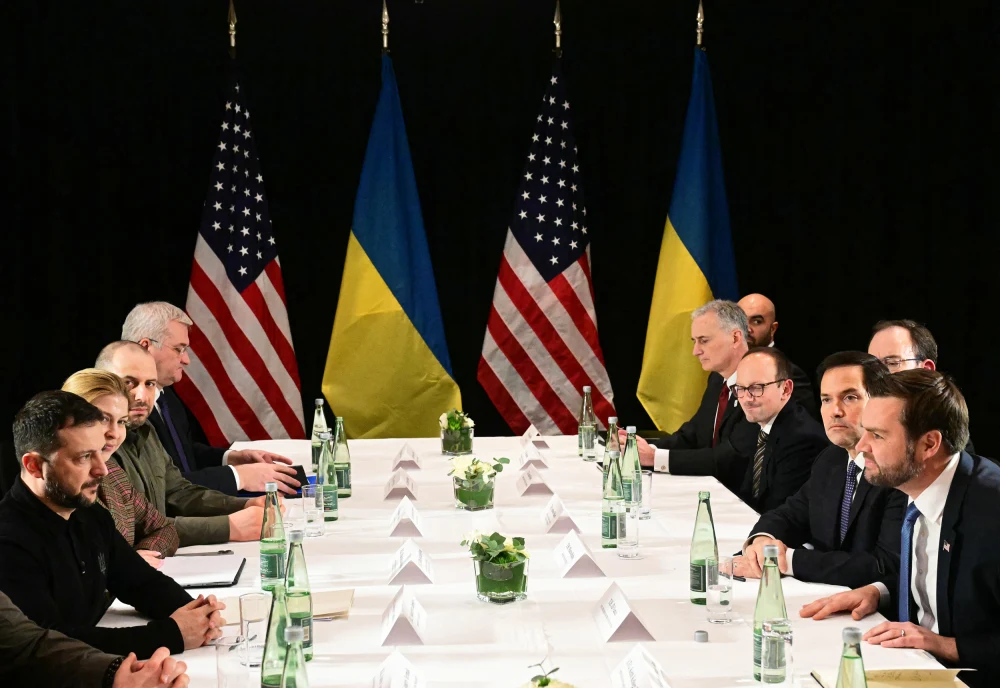Українською читайте тут.
Media outlets affiliated with the Democratic or Republican parties, as well as centrist media, refute Trump's false claims, although they vary in the severity of their rhetoric.
On 18 February, the delegations of the United States and Russia held talks in Saudi Arabia's capital. The participants' common position was the demand for elections in Ukraine to further the peace process. In just two days, there were dramatic changes in world politics: a violation of the principle of ‘nothing about Ukraine without Ukraine’, a convergence of positions between Washington and Moscow, and unprecedented rhetorical attacks by the US president on the president of Ukraine.
At a briefing on the results of the talks in Mar-a-Lago, Trump shifted the responsibility for the war to Ukraine and said that Zelenskyy's rating was 4%, so elections were needed, and this was not a demand from Russia, but from Trump himself and other countries. Zelenskyy called Trump's words disinformation of Russian origin. In response, Trump and his entourage further escalated their rhetoric against Zelenskyy. In particular, US Vice President J.D. Vance accused the Ukrainian president of slandering the US president. National Security Advisor Mike Volz criticised Kyiv for refusing to sign an agreement on the transfer of some rights to Ukrainian minerals to the US. Finally, Trump responded on Truth Social, accusing Zelenskyy of starting a war with Russia and calling him a dictator, just as he had done at the briefing: ‘A Dictator without Elections, Zelenskyy better move fast or he is not going to have a Country left.’ He also assured of successful negotiations with Russia to end the war.
According to the KIIS poll, Zelenskyy's approval rating has not fallen below 50% since the start of the full-scale invasion, and in February 2025, it was around 57%. After Trump's attacks, several European leaders expressed support for Zelenskyy, including German Chancellor Olaf Scholz, British Prime Minister Keir Starmer, and Norwegian Prime Minister Jonas Gahr Støre.
We analyse how the verbal dispute between Kyiv and Washington was covered by the leading American media.
CNN's article ‘As Trump’s attacks on Zelensky turn personal, there’s only one winner: Russia’ suggests that the relationship between Trump and Zelenskyy is being marred by echoes of the ill-fated 2019 phone call between the two that launched impeachment proceedings against Trump in his first term. The publication paints a gloomy picture of Ukraine's prospects after losing the favour of the new administration in the White House: ‘The existential dilemma now for Ukraine is whether it even has the luxury of choice between its wartime president and its main military backer, the United States.’ Trump's recent policies, including his attacks on Zelenskyy, are interpreted as a surrender of interests in favour of the main enemy: ‘Trump's radical rewriting of the world order over the past two weeks has served only one strategic interest. And this is the interest of one adversary, which NATO was created to confront.’
Separately, CNN published a material titled ‘Fact check: Trump’s barrage of lies about Zelensky and Ukraine’, which refutes Trump's theses about Ukraine's responsibility for the outbreak of war, Zelenskyy's low ratings, the amount of US aid to Ukraine, and allegedly missing US funds.
The New York Times strongly criticises Trump in its article ‘Trump Flips the Script on the Ukraine War, Blaming Zelensky Not Putin’. The newspaper reminds us that three years ago, when “Russian forces crashed over the borders into Ukraine in 2022 determined to wipe it off the map as an independent state,” the United States rushed to the rescue and saw Zelensky as a hero of resistance.
“Three years almost to the day later, President Trump is rewriting the history of Russia’s invasion of its smaller neighbor. Ukraine, in this version, is not a victim but a villain. And Mr. Zelensky is not a latter-day Winston Churchill, but a “dictator without elections” who somehow started the war himself and conned America into helping.” It is emphasised that Trump's revisionism creates the basis for an unprecedented geopolitical turn of the United States for generations.
NBC News, in its article ‘Inside the week that upended U.S.-Ukraine relations’, citing its sources, describes in detail the behind-the-scenes tensions that grew between Zelenskyy and Trump before the conflict went public. One of the key stages in the cooling between Kyiv and Washington was Zelenskyy's refusal to sign a document brought to Kyiv by the new administration's Treasury Secretary Scott Bessent, which was supposed to grant the United States ownership of half of Ukraine's rare earth minerals. According to five American officials interviewed by the publication and another person familiar with the discussion, Bessent gave Zelenskyy no more than an hour to read and sign the document in an ultimatum. He stressed that this agreement is a critical component of building a strategic partnership between the US and Ukraine and will help guarantee Kyiv's security after the war. NBC News, as well as some other media outlets, refuted Trump in the headline of their respective stories, for example, in the text ‘Trump falsely calls Ukraine's Zelenskyy a 'dictator,' escalating a spat between the leaders’.
The New York Post denied Trump's remarks about Zelenskyy by quoting other representatives of the Republican Party and conservative former British Prime Minister Boris Johnson. In addition, on the evening of 18 February, an editorial titled ‘Trump is asking for FAR too much ‘payback’ from war-torn Ukraine’ was published. Bessent's document is described as being harsher than the conditions imposed on Germany by the victorious Allies under the Treaty of Versailles after the First World War. The New York Post also rejected shifting the responsibility for the war to Ukraine. The newspaper attributed Trump's statements to his role as a tough negotiator, but still rejected the current rhetoric as unacceptable: ‘He (Zelenskyy - DM) didn’t start it, and he’s had no chance to end it except by surrendering to the blood-soaked invader: Whatever negotiating tactics Trump cares to use, turning the truth completely upside down ought to be beneath him.’
The following day, Isaac Schorr's op-ed, ‘Trump risks repeating Biden’s Afghanistan disaster by appeasing Putin,’ called Trump's actions ‘a strategic sin as well as a moral one.’ ‘If peace is his heart’s truest desire, the president should be trying to put pressure on Putin to agree to one favorable to American interests,’ the article says.
NewsMax, a media outlet close to the Republicans, covered the event in a restrained manner, with news stories featuring direct statements from both Trump and Zelenskyy. It did not directly refute Trump's statements. At the same time, the outlet balanced Trump's critical attacks with Secretary of State Marco Rubio's statement that both Ukraine and Europe would be involved in the negotiations in the future. It also quoted Trump as saying that he personally likes Zelenskyy, but he does not think about personalities but rather about the need to get the job done to end the war.
It was Jackie Heinrich, the White House press pool correspondent for Fox News, who wrote on her X page that following the talks, the United States and Russia agreed on a three-stage peace plan that includes a ceasefire, new elections in Ukraine and a final agreement. At the same time, she wrote in the same post that such a plan would be controversial ‘as Russia does not hold true elections and the Ukrainians balk at the prospect of installing a pro-Russia puppet president.’
The Fox News article ‘Zelenskyy faces perilous re-election odds as US, Russia push Ukraine to go to the polls as part of peace deal’ provides realistic ratings of Zelenskyy's credibility. It is mentioned that former president and opposition leader Petro Poroshenko opposes elections before the war is over, as does Zelenskyy. It is assumed that Russia will try to influence these elections. The article also cites experts' opinions that Zelenskyy's re-election depends on the nature of the peace deal and that his chances of winning before the agreement are likely to be higher than after.
The transatlantic values gap
In recent months, demands for elections and accusations of dictatorship by Trump officials have been levelled at a number of leading European democracies. In particular, Elon Musk, the head of the Trump administration’s Department of Government Efficiency and one of his main campaign donors has called the UK a “tyrannical police state” and called for the imprisonment of Prime Minister Keir Starmer and a new election in that country. He has also called German Chancellor Olaf Scholz a fool and called for his immediate resignation. He has also called the judges of Romania’s Constitutional Court, who unanimously annulled the results of the first round of the presidential election, which won the far-right, pro-Russian candidate Călin Georgescu, who considers Ukraine a “fictional state,” dictators. The court cited interference in the electoral process in Georgescu’s favour from outside the country as the reason for the decision.
US Vice President J.D. Vance, in his speech in Munich on February 14, accused the UK, Sweden, Germany, Romania and the European Commission of abandoning democratic values and freedom of speech. He also called the fight against disinformation an ugly Soviet practice that encroaches on alternative points of view. He also expressed doubts about the need to protect such a Europe within the framework of a defence alliance and linked the alliance's effectiveness to the Europeans changing their policies, in particular through cooperation with anti-immigrant forces.
So, the new administration's attacks on Zelenskyy are taking place in the context of a broader value and security gap between the US and Europe. This topic has been raised by most of the leading media outlets in Europe and the US in their articles in recent days. In particular, The New York Times writes about the most dramatic U-turn in US foreign policy since World War II in the article "Trump’s Pivot Toward Putin’s Russia Upends Generations of U.S. Policy." The Washington Post writes about the rapprochement of values between Moscow and Washington in the article "Putin raised the anti-woke banner long before it flew over Washington." Politico published an article entitled "Trump’s America is Putin’s ally now." "Europe’s politicians are beginning to grasp how profoundly their world has changed: They must now deal with an America that is at best skeptical and at worst hostile to the old world they represent," the article says.
On the other side of the Atlantic, the German newspaper Die Welt writes: ‘Three years after the start of the war in Ukraine, we are witnessing another turning point. The United States, under the leadership of Donald Trump, is shaking the foundations of the world order in which Europe has felt safe for decades.’
In Europe, Trump administration officials and the Kremlin support virtually the same forces that oppose post-war liberal elites: Reform UK, Alternative for Germany, and Romanian presidential candidate Călin Georgescu.
For the new US administration, Zelenskyy is in the same company as Scholz or Starmer. The context of the Russian-Ukrainian war makes rhetorical attacks on Ukraine's democratic system the culminating symbol of a crack in the US-European Union. At the same time, the critical reaction of the leading American media, including a number of those close to the Republican Party, to Trump's latest anti-Ukrainian statements shows that if Kyiv has lost the fight for the heart of the newly elected American president, the fight for the understanding of American elites remains unwinnable.
Illustration: a screenshot of the NBC News article «Inside the week that upended U.S.-Ukraine relations»



